
As the Easter long weekend unfolds, the Border Management Authority (BMA) Commissioner, Dr Michael Masiapato, is actively overseeing oprations at South Africa’s ports of entry to ensure secure and efficient travel. Currently stationed at the Lebombo port of entry, Commissioner Masiapato is monitoring accelerated security control measures during this busy holiday period. The BMA, recognised as South Africa’s third law enforcement service, has introduced cutting-edge technology, including drones and body-worn cameras, alongside adjusted service hours to manage the Easter travel surge effectively.
For the first time this Easter weekend, the BMA has deployed four advanced unmanned aerial vehicles (UAVs), or drones, and 40 body-worn cameras at key ports of entry, such as Lebombo and Beitbridge. These drones are fitted with some of the world’s most advanced night vision cameras and thermal detection technology. Powered by Artificial Intelligence (AI), they can identify and track heat sources, moving people, or vehicles with precision. Capable of reaching speeds up to 43 kilometres per hour, the drones can operate in remote rural areas without GPS and even underground, making them a formidable tool in border management.
The body-worn cameras, worn by BMA officials, enhance transparency and accountability while providing court-admissible evidence to support convictions. This technological deployment builds on a successful pilot during the 2024/2025 festive season, where drones significantly boosted the detection of illegal border crossings, identifying over 2,000 incidents.
Commissioner Masiapato is on the ground at the Lebombo port of entry from 15 to 18 April 2025, overseeing security measures as travellers exit South Africa for the Easter holidays. His presence ensures that deployments and traveller movements are closely monitored, maintaining order at one of the country’s busiest ports, which connects South Africa to Mozambique. Following this, he will shift to the Beitbridge port of entry from 20 to 22 April 2025 to supervise operations as holidaymakers return, reinforcing security at this critical gateway to Zimbabwe.
The BMA has adjusted service hours at various ports to accommodate the expected influx of travellers, building on last year’s processing of over 1.1 million people across 71 ports during Easter. These adjustments, combined with the Commissioner’s oversight, aim to facilitate smooth and safe travel.
The BMA’s deployment of drones and body-worn cameras is part of a broader strategy to prevent illegal activities, such as smuggling and human trafficking, which often increase during holiday periods. The technology not only aids in detection but also serves as a deterrent. During the festive season pilot, drones identified 2,188 illegal crossings and 2,326 breaches in border fences, enabling swift repairs and arrests. This Easter, the BMA continues to collaborate with agencies like the South African Police Service (SAPS) and the South African National Defence Force (SANDF) to ensure a robust response to any threats.
The BMA’s efforts reflect a commitment to balancing border security with the facilitation of legitimate travel and trade. By working with neighbouring countries like Mozambique and Zimbabwe to align operating hours and share intelligence, the authority ensures a coordinated approach. Commissioner Masiapato has emphasised that the goal is prevention, not just reaction: “The purpose is to deter people from coming into the country illegally,” he stated, highlighting the proactive stance of the BMA.
Read the full article here